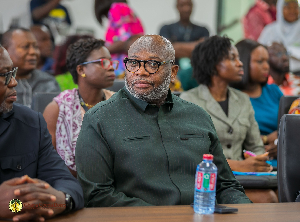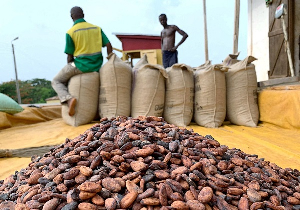By
Dr. Frank Essien
I recently visited Ghana and one cannot miss the plastic waste that is swallowing the motherland. Most of this plastic waste is coming from the sachet water, which is a common feature of the street vending business in Ghana, and the blue plastic wrappings for Fanti kenkey sold along the highway from Mankesim, Yamoransa Junction, and Cape Coast all the way to Takoradi. The waste from these plastic wrappings that are indiscriminately strewed along the Accra-Cape Coast-Takoradi highway is an eyesore and something needs to be done about it immediately.
Plastic is a highly useful material and its applications are expected to increase as more new plastic products are developed to meet demands. However, the increase use and production of plastic in developing nation such as Ghana should be a concern of policy makers since the sophistication of waste management infrastructure may not be developing at an appropriate rate to deal with the increasing level of plastic waste.
Plastic waste, and for that matter, plastic pollution involves the accumulation of plastic products in the environment that adversely affects humans, wildlife and wildlife habitat. Plastic pollution occurs in many forms, including, but not limited to LITTERING which is the major problem in Ghana. About 85% of the solid waste dredged from choking gutters around the Market Circle in Takoradi was made of plastic from sachet water. Takoradi is no exception because same could be said of Accra and Kumasi.
I know that besides plastics, there are other pollutants in the environment that I could address and you as a reader might be wondering why I am picking on Plastic Pollution. Well, as I stated earlier, plastic usage is expected to increase and this pollutant particularly from sachet water and kenkey wrapping is not biodegradable. It is estimated that the decomposition of such plastics takes about 400 years. No one will live so long to witness decomposition of plastics! Thus, we should start plans to save the environment for future generations of humans as well as animals.
In Ghana, the immediate threat is with our landfill sites and our drainage system. Landfill sites are for organized disposal of waste materials and non-biodegradable materials such as plastics tend to artificially clog such sites. It is worth noting that these landfill sites are not inexhaustible. Clogging our poorly maintained drainage system (opened filthy gutters, bequeathed us by the colonialists, which have not seen any major improvements yet) is the result of plastic pollution. Are we not concerned about the perennial flooding in major cities and towns in Ghana because of poor and clogged drainage system? Are we not concerned about the creation of breeding places for mosquitoes? Besides plastic waste creating eyesore that interfere with the enjoyment of the natural environment by humans, there are other ill-effects of this pollutant that I need not bore my readers with since that is not the crux of this discussion.
My first suggestion to curb the plastic waste problems in the Motherland is a Comprehensive government- sponsored recycling program. Since I do not believe in reinventing the wheel to address pressing needs, I suggest a look at the New York State Bottle Bill which has considerably reduced waste from bottles, broken bottles and other plastic beverage containers in the state. The New York State Returnable Container Act (more commonly referred to as the "Bottle Bill") is in Article 27, Title 10 of the Environmental Conservation Law (ECL), Sections 27-1001 to 27-1019. It was originally enacted on June 15, 1982, and became effective July 1, 1983. This is how the New York's Bottle Bill works:
1. Deposit initiators collect at least a 5-cent deposit from each distributor or dealer on each beverage container sold to such distributors or dealers in New York.
2. Dealers (commonly referred to as "retailers") pay the distributor or deposit initiator at least a 5-cent deposit for each beverage container purchased.
3. Consumers pay the dealers the deposit for each beverage container purchased.
4. Consumers may then return their empty beverage containers to a dealer or redemption center to get their deposit back.
5. Retailers and redemption centers are reimbursed the deposit plus a 3.5-cent handling fee by the distributor or the deposit initiator for each empty beverage container returned.
My understanding is that there are efforts to encourage recycling in parts of the country starting in Accra for plastic from sachet water, but this needs a lot of revamping and a look at the New York State model might be helpful. If people could pay a redeemable fee for a sachet of water and return the empty plastic container (not mutilated) for a refund it will go a long way to reduce the plastic waste. It could give rise to recycling and collection businesses and in the long run save our environment from some of the ills of plastic waste pollution and its other problems.
The other suggestion is a joint effort from civil society to develop a habit of proper plastic waste disposal in designated waste containers. The problem here is that human beings of all shades and hues have the inclination of doing things the easy way. If there are no sanctions for carelessly throwing away plastic from sachet water and Fanti kenkey, as has been happening, most people will chose the easy way of not walking to the collection bins. Sanctioning indiscriminate litter bugs is nothing new in many countries, developed and developing. A typical example is Malaysia. Let us remember what the great Dr. Ephraim Amu wrote: Yen Ara Asaase Ni… Fellow Ghanaians, this is our land, this is our country. The prosperity of the Motherland is in the interest of us all. Let us put our minds, thoughts, strengths and all together to build the Motherland. Let us embrace this famous maxim in New York City: If you see something, say something!
Dr. Frank Essien
University at Albany,
Albany, New York
USA
Opinions of Wednesday, 5 February 2014
Columnist: Essien, Frank














